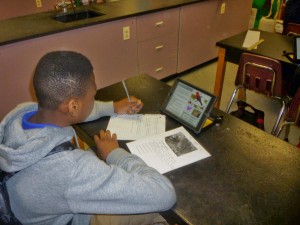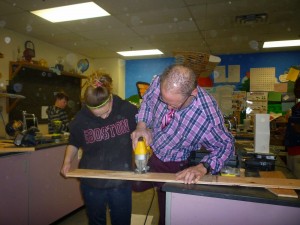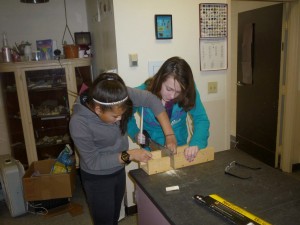At the Kurn Hattin School, sawdust is flying everywhere. In February, this VT 4-H programming partner received 10 Apple iPads to start the 3rd year of their participation in UVM Extension’s Office of Juvenile Justice and Delinquency Prevention (OJJDP) funded grant, 4-H Tech Wizards.
In an earlier Tech Wizards experience, the students constructed models of bridges using materials that simulated those in a real bridge. The students and their mentors were eager to use the new iPads to move from a simulated structural engineering scenario to something more “real”.
students and their mentors were eager to use the new iPads to move from a simulated structural engineering scenario to something more “real”.
After a 2 week, iPad-assisted study using Peterson’s Backyard Birds app to learn characteristics, visual identification and recognition of the calls of different birds, students further researched the Internet and wrote reports on birds of their choosing and successfully identified birds in outside, field study. They discovered that some birds, such as the blue bird or chickadee, nest in tree cavities and as forests are cleared for human developments, habitats such as mature forests with decayed trees are destroyed, reducing essential habitat for cavity-nesting birds.
After learning about bird habitats and shelters, the students wanted to construct nest box birdhousesto help increase the populations of many of these cavity-nesting birds such as bluebirds, finch, robins and chickadees.
Their engineering goal was to solve a problem with the use of technology – ranging from complex to simple – with iPads, hand saws, hammers, tape measures, glue and nails.
 Their Tech Wizard mentors introduced and discussed the difference of the tools and materials and instructed in safety precautions and tool skills and the students evaluated each other’s work using rubrics to assess hand saw technique and their finished bird houses.
Their Tech Wizard mentors introduced and discussed the difference of the tools and materials and instructed in safety precautions and tool skills and the students evaluated each other’s work using rubrics to assess hand saw technique and their finished bird houses.
Working in pairs, students created nesting boxes that will be donated and placed near the fields and ponds of the community Westminster, successfully demonstrating that students learned the 4-H life skills of decision making; communication, useful/marketable skills and community service while using the 4-H science skills of stating a problem, designing a solution, implementing a solution, measuring, and use of tools.
skills of decision making; communication, useful/marketable skills and community service while using the 4-H science skills of stating a problem, designing a solution, implementing a solution, measuring, and use of tools.
If you think this sounds like fun, decide which species you would like to attract and learn how. From there, you could become a citizen scientist and have fun while doing good. Participants in Nest Watch, a citizen-science project of the Cornell Lab of Ornithology, monitor bird nests in their nest boxes (or any other place), gathering information such as the number of eggs or young in the nest. Good luck and let us know how many bird houses you build or how many nests you find as a citizen scientist.


Recent Comments